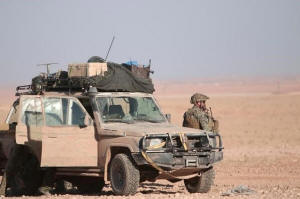|
New U.S.-backed 'border force' in Syria
infuriates Ankara, Damascus
 Send a link to a friend
Send a link to a friend
 [January 15, 2018]
By Ellen Francis and Jack Stubbs [January 15, 2018]
By Ellen Francis and Jack Stubbs
BEIRUT/MOSCOW (Reuters) - Syria, Turkey and
Russia responded vehemently on Monday to new U.S.-backed plans to set up
a 30,000-strong "border force" inside Syria to protect territory held by
Washington's mainly Kurdish allies.
The Syrian government vowed to drive the U.S. presence from the country.
Turkey, an increasingly estranged U.S. ally within NATO, accused
Washington of setting up a "terror army" on the Turkish border, and said
it would take steps to protect itself.
Russia, the main ally of Syrian President Bashar al-Assad, said the U.S.
plans revealed a plot to partition Syria.
The United States has led an international coalition using air strikes
and special forces troops to aid fighters on the ground battling Islamic
State militants in Syria since 2014. It has about 2,000 troops on the
ground in Syria.

The U.S. intervention has taken place mainly on the periphery of a
nearly seven-year civil war that has killed hundreds of thousands of
people and driven more than 11 million from their homes.
Islamic State was effectively defeated last year, but Washington says
its troops are prepared to stay to make sure the Islamist militant group
cannot return, also citing the need for meaningful progress in U.N.-led
peace talks.
The government of President Bashar al-Assad, backed by Russia and Iran,
has made great strides over the past two years in defeating a range of
opponents and has restored control of nearly all of Syria's main cities
and towns. It considers the continued U.S. presence a threat to its
ambition to restore full control over the entire country.
On Sunday, the U.S.-led coalition said it was working with its Syrian
militia allies, the mainly Kurdish-led Syrian Democratic Forces (SDF),
to set up a new 30,000-strong border force. The force would operate
along the borders with Turkey and Iraq, as well as within Syria along
the Euphrates River, which separates most SDF territory from that held
by the government.
The plan has infuriated Turkey, which considers the Kurdish forces
supported by the United States to be a threat to its national security.
It says the Syrian Kurdish PYD movement and the affiliated YPG militia,
which forms the main backbone of the U.S.-backed SDF force in Syria, are
allies of the PKK, a banned Kurdish group waging an insurgency in
southern Turkey.
"The USA...setting up a would-be terror army under the guise of a
'Syrian Border Security Force' amounts to playing with fire," Turkish
Deputy Prime Minister Bekir Bozdag said on Twitter.

"The support which the USA has given to the Syrian PYD/YPG arm of the
PKK terror group until now, and the steps which it has announced are not
befitting a friendship, alliance, model partnership or strategic
partnership," he said.
"Turkey will not refrain from taking the necessary measures and steps to
protect our country and region's security. To use our president's
expression: 'We may come suddenly one night.'"
[to top of second column]
|

A U.S. fighter stands near a military vehicle, north of Raqqa city,
Syria November 6, 2016. REUTERS/Rodi Said

WINNERS
Syria's main Kurdish groups have emerged as one of the few winners
in the Syrian war and are working to entrench their autonomy over
large parts of northern Syria. Washington opposes those autonomy
plans, even as it has backed the SDF.
The Syrian government and the main Kurdish parties have mostly
avoided conflict during the civil war, as both sides focused on
fighting other groups. But Assad's rhetoric toward the Kurds has
turned increasingly hostile.
Damascus denounced the new border force as a "blatant assault" on
its sovereignty, Syrian state media said. It said any Syrian who
joined the force would be deemed "a traitor".
"What the American administration has done comes in the context of
its destructive policy in the region to fragment countries ... and
impede any solutions to the crises," state news agency SANA cited a
foreign ministry source as saying.
Russian Foreign Minister Sergei Lavrov said of the border force
plan: "The actions that we see now show that the United States does
not want to maintain the territorial integrity of Syria.

"Literally yesterday, a new initiative was announced about how the
U.S. wants to help the so-called Syrian Democratic Forces create
some border security zones. Fundamentally, this means the breakup of
a large territory along the border with Turkey and Iraq."
The zone would be controlled by groups "under the leadership of the
United States", he added. "This is a very serious issue that raises
concerns that a path toward the partition of Syria has been taken,"
he said.
The coalition said the Border Security Force would operate under SDF
command, and about 230 individuals were currently undergoing
training in its inaugural class.
Its ethnic composition will reflect the areas in which the force
serves. More Arabs would serve along the Euphrates River Valley and
the Iraqi border, and more Kurds would serve in areas of northern
Syria, the coalition said.
(Additional reporting by Daren Butler in Istanbul and Gabrielle
Tetrault-Farber in Moscow; Writing by Tom Perry in Beirut; Editing
by Peter Graff)
[© 2018 Thomson Reuters. All rights
reserved.]
Copyright 2018 Reuters. All rights reserved. This material may not be published,
broadcast, rewritten or redistributed. |